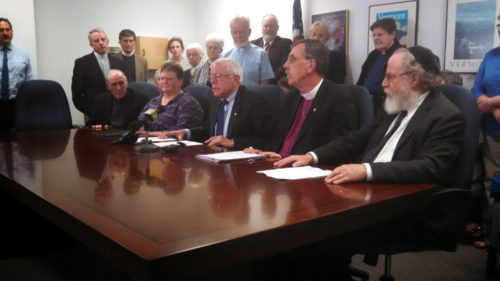Vermont: Senator, bishop, faith leaders discuss economic justicePosted Jun 23, 2014 |
|

From left, Monsignor Roland Rivard, the Rev. Lynn Bujnak, U.S. Senator Bernie Sanders, Bishop Thomas Ely and Rabbi Joshua Chasan. Photo: Episcopal Diocese of Vermont
[Episcopal Diocese of Vermont] On June 20, U.S. Senator Bernie Sanders (I-VT) held a news conference with Vermont religious leaders to discuss the moral implications of extreme wealth and income inequality. Bishop Thomas Ely, Rabbi Joshua Chasan, the Rev. Lynn Bujnak, and Monsignor Roland Rivard were present, as well as several other Episcopal clergy and faith leaders.
Bishop Ely’s participation in this news conference is in keeping with the resolution on the subject of economic justice and income inequality passed at The Episcopal Church in Vermont’s 2013 Diocesan Convention.
Below is the transcript of Bishop Ely’s statement:
Thank you Senator Sanders.
Thank you for your advocacy on so many important issues and especially your leadership in the area of economic justice and income inequality. I am glad to add my voice to yours and these distinguished colleagues who provide important leadership and direction in our Vermont faith communities.
The President has called income disparity “the defining challenge of our time.” He speaks an important truth to us. Economic justice and income inequality are indeed moral issues of immediate and urgent concern and present us with important choices about how we will live and how we will act.
Many years ago Supreme Court Justice Brandies declared “We may have democracy, or we may have wealth concentrated in the hands of a few, but we cannot have both.” Evidence suggests that inequality is not only corroding our political system but eroding social cohesion as well.
The systematic undermining of the middle class has had serious consequences for the preservation of families, health, education and employment and even greater consequences for those in the bottom 30%. Social unrest is a growing possibility.
Our financial system has become deeply distorted: financial institutions that are “too big to fail,” investment instruments few can understand, and pervasive conflicts of interests that are threatening the ongoing ecological stability of our world all contribute to this reality.
The suffering and overpowered majority will continue to lose the struggle for jobs, affordable housing, education, retirement security, and a sustainable environment if we keep silent. This situation cries out for us to open our eyes, ears, minds and hearts to this growing bitter reality. The excesses of the sin of avarice, of greed, along with the sin of pride, are at work in our midst and have the potential to destroy so much of what we cherish.
These are critical ethical issues, touching on our obligations to each other as human beings, and therefore central to our faith traditions. We as faith community leaders have a responsibility to provide leadership on these moral issues, which have such a direct impact on so many of our fellow Vermonters.
The people of the Episcopal Church in Vermont have called upon our Presiding Bishop, The Most Reverend Katharine Jefferts Schori to convene a nationwide interfaith coalition to provide moral leadership for the establishment of economic justice in our country. We have also adopted a statement on Economic Justice and Income Inequality prepared by our leadership Council (and available on our website). And, in a concrete effort to put our faith and conviction into action, our annual Convention urged all our congregations, as well as the bishop’s office, to pay all lay employees an hourly livable wage appropriate for the State of Vermont.
For me, the call to engage this challenge is grounded in the words Jesus used to summarize the commandments that informed his faith, as well as the great Hebrew prophets before him, and which is expressed this way in the Gospel according to Matthew: You shall love the Lord your God with all your heart, and with all your soul, and with all your mind. This is the greatest and first commandment. And a second is like it: You shall love your neighbor as yourself. On these two commandments hang all the law and the prophets. (Matthew 22:36-40)
Borrowing from the teaching of Archbishop Rowan Williams in his book Faith in the Marketplace, we are reminded that maintaining wealth at the cost of our neighbor’s disadvantage, or worse, is inhumane – what the other finds painful I should find painful too. True love of neighbor is the moral and ethical imperative that can lead us from greed to generosity, from economic disparity to economic justice.
©The Right Reverend Thomas C. Ely, Bishop of the Episcopal Church in Vermont

Social Menu